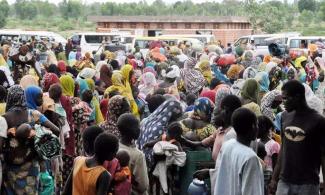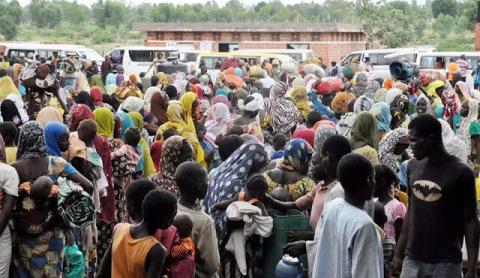
“Nigerian refugees continue to arrive in very remote and impoverished communities in neighbouring countries. An estimated 30,000 have fled the city of Rann over the weekend alone to seek refuge across the Cameroonian border," Babar Baloch, spokesman of the United Nations High Commission for Refugees (UNHCR), said.

The United Nations says about 30,000 people fled Rann in Borno State, over the weekend.
Babar Baloch, spokesman of the United Nations High Commission for Refugees (UNHCR), made this known at a press briefing held at the Palais des Nations in Geneva on Tuesday.
The press briefing was part of activities for the launch of the 2019 Nigeria Regional Refugee Response Plan (RRRP), an appeal for US$135million to help hundreds of thousands of people displaced by the worsening Boko Haram insurgency in the Lake Chad Basin region.
According to Baloch, more than 250,000 people have been displaced from northeast Nigeria due to attacks by insurgents.
His words: “With more 250,000 children, women and men already uprooted from northeast Nigeria, surging militant attacks are targeting civilians and forcing thousands more to run for their lives each day. Young girls, old women and aid workers continue to bear the brunt of this escalating violence.
“A recent upsurge in violence in north-east Nigeria has driven more than 80,000 civilians to seek refuge in already crowded camps or in towns in Borno State, where they are surviving in tough living conditions.
“Nigerian refugees continue to arrive in very remote and impoverished communities in neighbouring countries. An estimated 30,000 have fled the city of Rann over the weekend alone to seek refuge across the Cameroonian border. Thousands have also fled to neighbouring Cameroon and Chad in recent weeks. The hostilities have strained humanitarian operations there and forced aid workers to pull out from some locations. The destruction of livelihoods and infrastructure is widespread.
“The escalation in the conflict has thwarted people’s intention of returning to their homes. Some refugees that attempted to return to their homes and communities have become displaced multiple times inside Nigeria or have become refugees a second time in Cameroon, Chad and Niger.”
Speaking on the need for stakeholders to support the initiative, he continued: “The newly launched aid appeal aims to broaden the humanitarian response towards a longer-term approach — to support those forced to flee and the communities hosting them. Refugee hosting communities are already living below the poverty line and in dire need of aid themselves with their ability to help the displaced being stretched to the limit.
“The 40 UN agencies and humanitarian organizations that joined the 2019 Nigeria Regional Refugee Response Plan (RRRP), will cater for the needs of a quarter million Nigerian refugees and 55,000 of their hosts in Niger, Cameroon and Chad.”
He also noted that 2.5 million people constitute displaced persons across the Lake Chad region, with more than 1.8 million of the figure inside Nigeria.
A Refugee Response Plan (RRP) is a UNHCR-led, inter-agency planning and coordination tool for large-scale or complex refugee situations. A similar appeal of US$157 million launched in 2018 was only 42 per cent funded, compared to 56 per cent of the US$241 million needed in 2017.
The UN and its partners are also seeking $848million to continue providing food, water, shelter and protection to the most vulnerable people in Nigeria, as part of the 2019-2021 Humanitarian Response Strategy for the country, which is simultaneously launched today in Abuja.